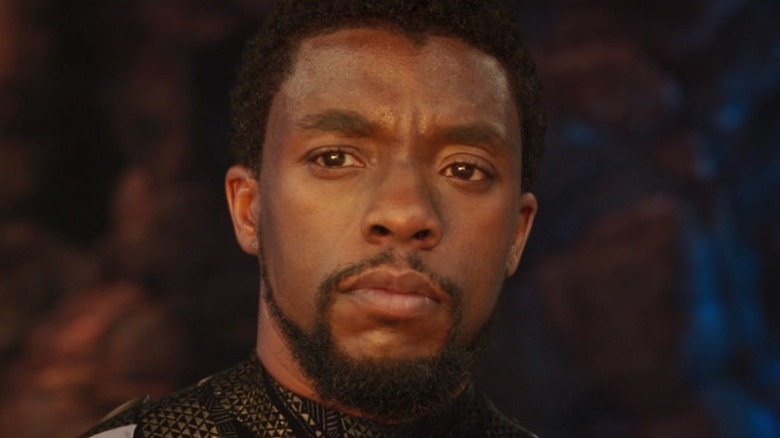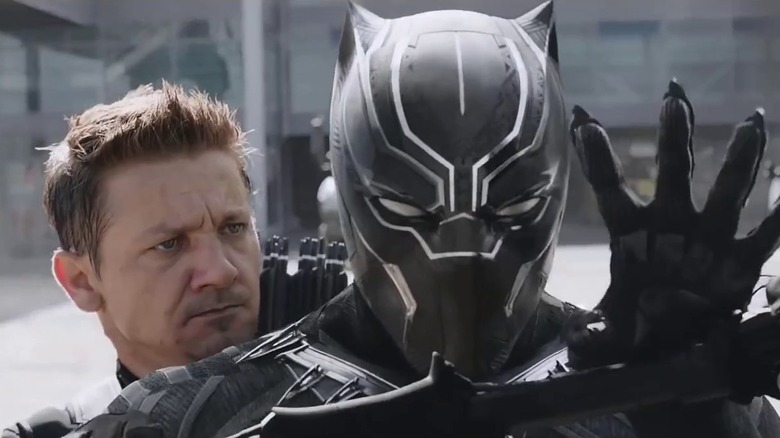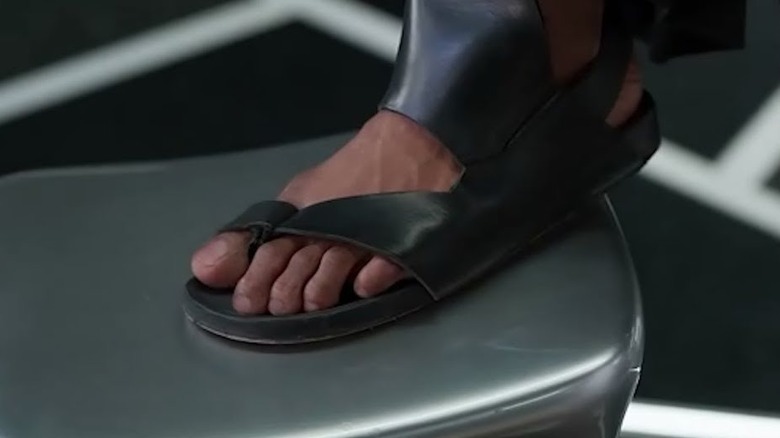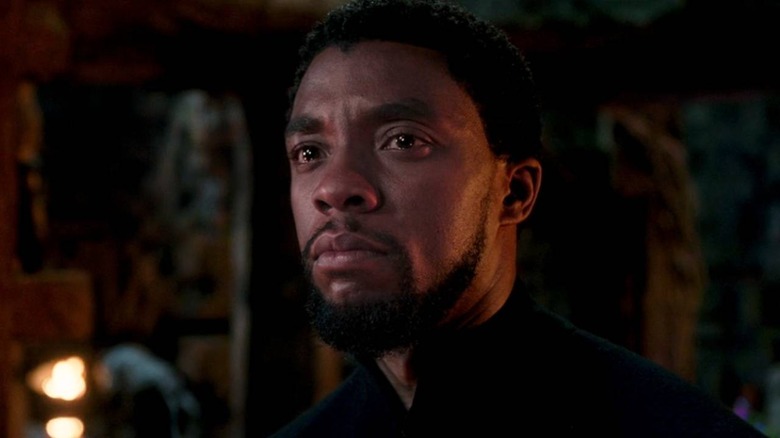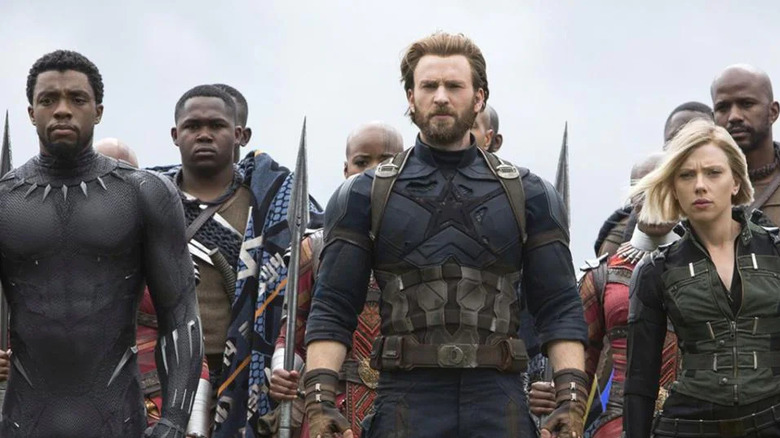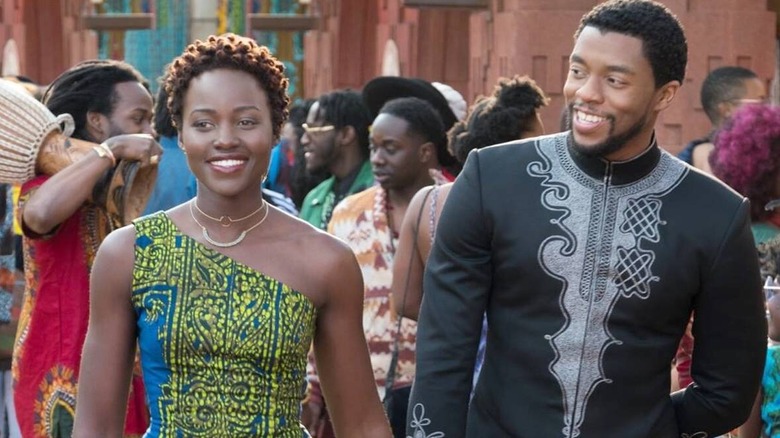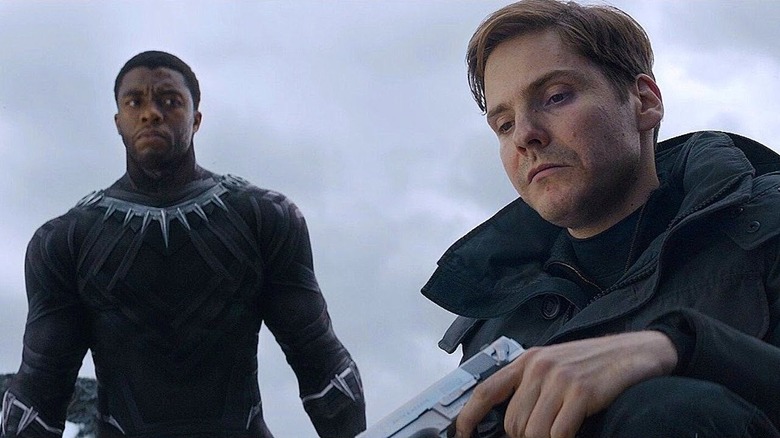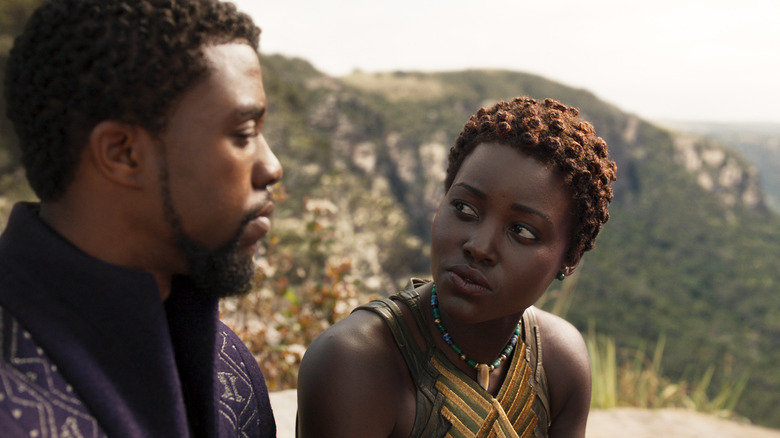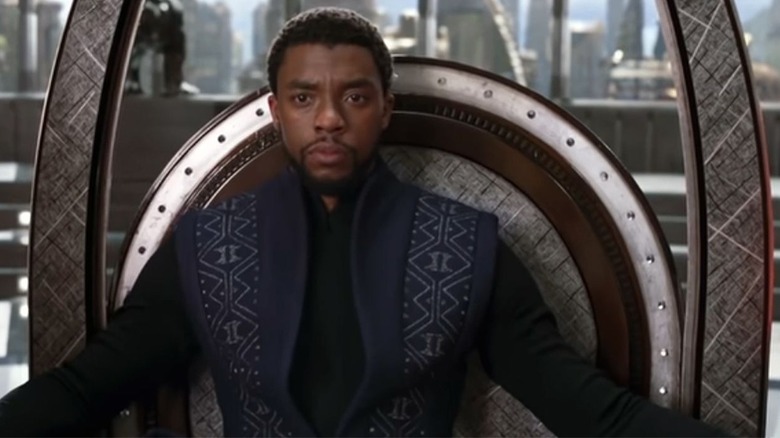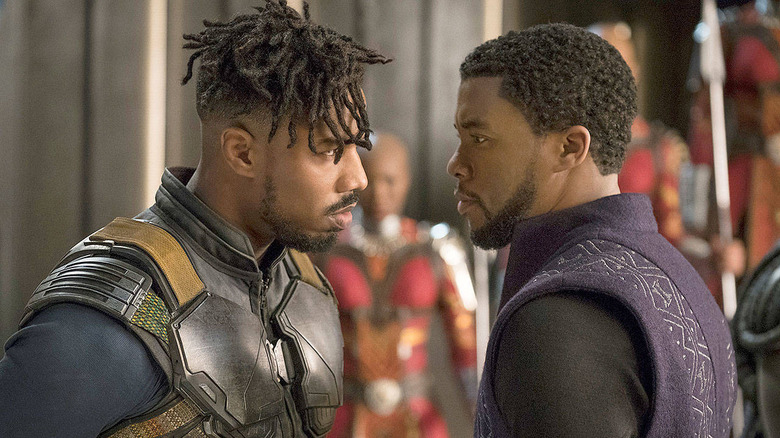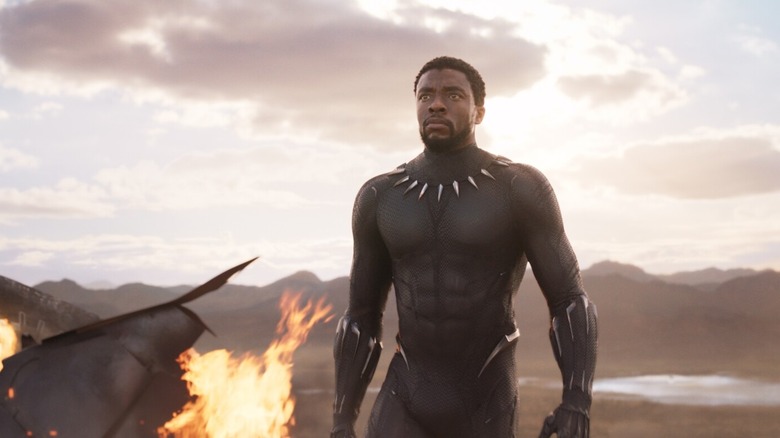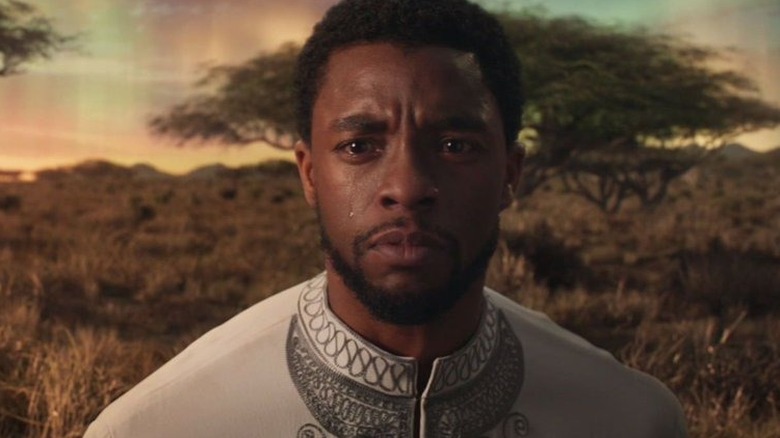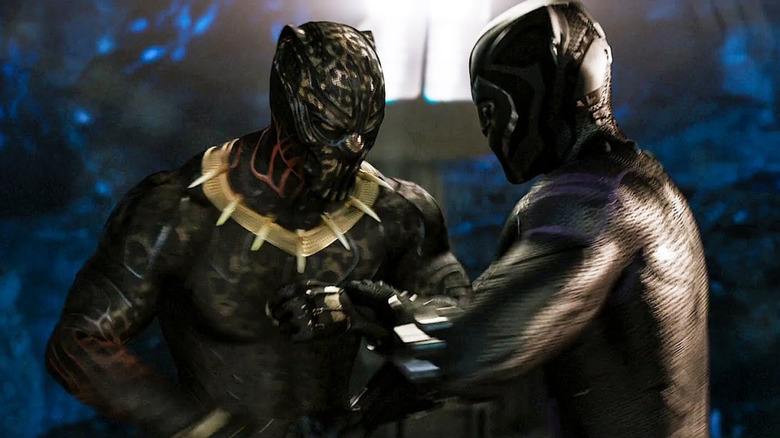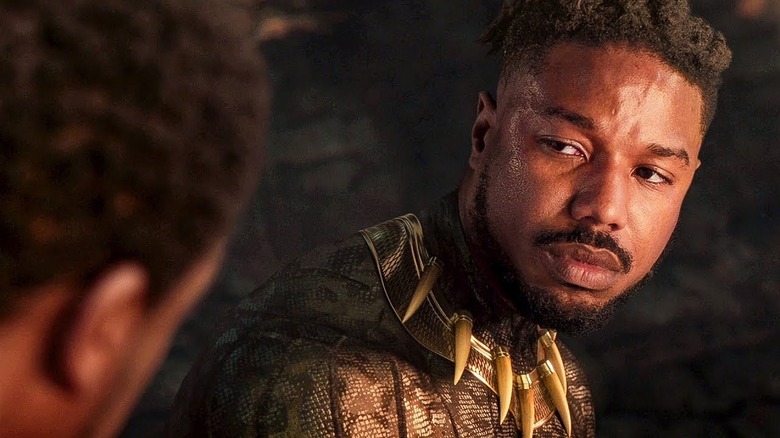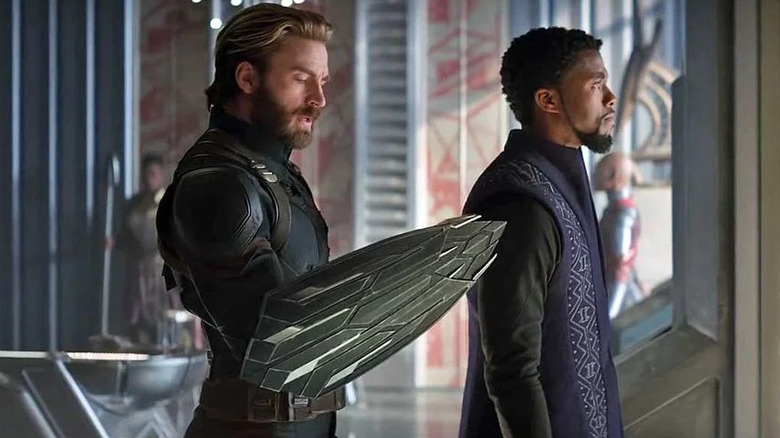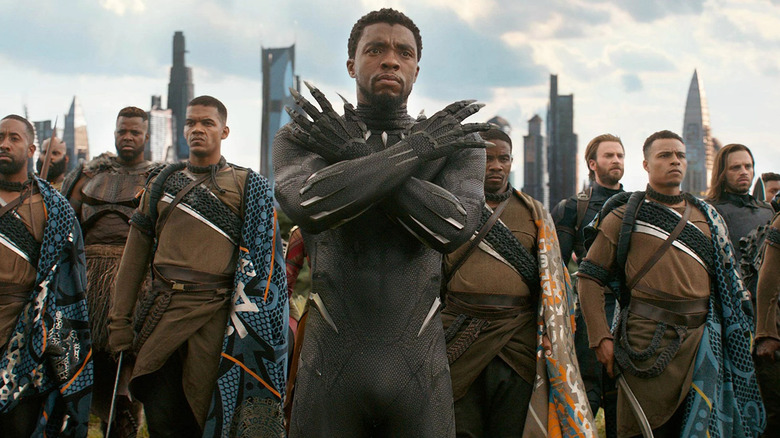Most Memorable Black Panther Quotes In The MCU
"Black Panther" was, unquestionably, one of Marvel's most successful films to date. While it held true to the MCUs comedic tone, it still managed to capture the essence of T'Challa's character as a king, a superhero, and a black man in this day and age. After the passing of T'Challa actor Chadwick Boseman, the future for "Black Panther 2" has been left ambiguous. While the studio gave the film a green light prior to his passing, fans were left wondering — who will take up the mantle of Black Panther?
Audiences were first introduced to T'Challa in "Captain America: Civil War" following the murder of his father, King T'Chaka. Fixated on a quest for revenge, T'Challa grows to become the rightful king of Wakanda. As the T'Challa story for Black Panther has, sadly, come to an end, it's time to look at the most memorable and quotable Black Panther moments in the MCU. These quotes all outline the character arc for T'Challa, and how he ends his story. From funny to serious, let's dive in. Welcome back to Wakanda!
I don't care
Audiences are first introduced to T'Challa's Black Panther in "Captain America: Civil War," where he has revenge on his mind after the death of his father, King T'Chaka (Bonisile John Kani). The film sees some of our favorite heroes fighting against one another, with some characters side with Iron Man (Robert Downey Jr.) while others stand with Captain America (Chris Evans).
The fight between the two parties all comes ahead during the film's iconic airport fight scene. It's here that T'Challa meets Clint Barton (Jeremy Renner). Before they begin to fight, Clint goes to introduce himself, as the two haven't yet met. However, T'Challa responds, "I don't care." He's a man on a mission, and his rage has blinded him. This is our first introduction to his character, and by the end of the film, audiences see that T'Challa is ready to forgive and seemingly take his place as King of Wakanda.
What, you don't like my royal sandals?
While T'Challla may be serious when audiences meet him in "Captain America: Civil War," "Black Panther" quickly demonstrates his lighter side. One early interaction introduces audiences to the adorable relationship between T'Challa and Shuri. Portrayed by Letitia Wright, Shuri first appears in "Black Panther" as T'Challa's loveable younger sister. She often jokes around with everyone, including the traditionally stoic General Okoye (Danai Gurira). While Shuri is known to crack a joke now and again, she takes her role as the leader of innovation in Wakanda seriously.
This is perfectly shown when T'Challa first enters her lab as the newly crowned king. She immediately questions why he's wearing sandals in her lab. He playfully responds, "What, you don't like my royal sandals? I wanted to go old school for my first day." Shuri is anything but impressed as her lab is a special place and the heart for all of Wakanda's technical advancements. For Shuri, toes have no place in her lab, but T'Challa can't help but poke fun at his little sister. This small moment signifies the strong bond these two siblings have.
I am your king now!
Once T'Challa comes across Erik Killmonger, he sees a ring identical to his dangling off Killmonger's neck. T'Challa knows that a ring like that could have only come from his uncle, N'Jobu (Sterling K. Brown), who he was told disappeared years ago. T'Challa asks Zuri (Forest Whitaker) the truth about his uncle's disappearance, as he was a trusted and loyal advisor to his father during his reign.
Unfortunately, Zuri refuses to say, telling T'Challa that some truths are too much to bear and that he promised King T'Chaka he would never speak about N'Jobu. This prompts T'Challa to yell in an uncharacteristic fit of rage, "I am your king now!" as he's eager to learn the truth. While T'Challa believes his father was a good man and a good king, once he sees that ring, he knows something is wrong. T'Chaka was someone that he deeply respected and looked up to, so knowing that his father was behind something so corrupt shakes T'Challa to his core, resulting in his raised voice and outburst of emotion.
You are in Wakanda now
In "Avengers: Infinity War," a damaged Vision (Paul Bettany) is brought to Wakanda in the hopes that Shuri can remove the Infinity Stone safely from his head. The Avengers know that Thanos is hunting the stones as he sends his two children, Proxima Midnight (Carrie Coon) and Corvus Glaive (Michael James Shaw), to retrieve Vision's stone for him. In an acknowledgment of their power, Captain America (Chris Evans) takes Vision to the one place on Earth that could stand against them — Wakanda.
While Shuri works to remove the Infinity Stone, Thanos' army lands in Wakanda, ready for a battle. Before the fighting begins, Proxima Midnight predicts that Thanos will have the stone. This prompts T'Challa to respond by saying, "You are in Wakanda now. Thanos will have nothing but dust, and blood." While T'Challa is there to help his friends, once Wakanda is threatened he turns the conversation on its head to let everyone know that he means business. As king, it's his job to protect Wakanda, and this quote lets everyone know that is exactly what he intends to do.
If you weren't so stubborn
T'Challa is someone who is surrounded by strong female characters. One of those characters is his childhood friend and love interest, Nakia. She helps influence T'Challa's path towards becoming a different kind of king than his father.
Portrayed by Academy Award winner Lupita Nyong'o, Nakia is a spy for Wakanda. She's often sent on missions around the world and has witnessed firsthand the hardships that people experience. It's because of this that she doesn't want to stay hidden in Wakanda. Instead, she wants to be a part of the world, arguing that Wakanda should actively help people. T'Challa sees this as her being stubborn, remarking, "If you weren't so stubborn, you would make a great queen."
Her response perfectly describes Nakia in a nutshell as she outlines that perhaps T'Challa doesn't understand what it means to rule, as her stubbornness would make her a great queen. This is something that he will, ultimately, need to learn to become a great king.
I am done letting it consume me
Throughout "Captain America: Civil War," T'Challa is hunting Bucky Barnes, aka the Winter Soldier (Sebastian Stan), who he believes is responsible for murdering his father, King T'Chaka. Blinded by revenge, T'Challa throws caution to the wind and is consumed by the idea of killing his father's murderer by any means necessary.
Once it's revealed that Helmut Zemo (Daniel Brühl) was actually responsible for his father's death, T'Challa makes a last-minute choice to spare him. T'Challa says to Zemo, "Vengeance has consumed you. It's consuming them. I am done letting it consume me." T'Challa realizes that revenge will not bring his father back and that he must take his rightful place as the new King of Wakanda. And, as far as T'Challa is concerned, being an executioner does not make for being a good king. He's seen how revenge is tearing apart the Avengers, and he does not wish the same to happen to him.
What kind of man does that?
Once T'Challa learns the truth about what his father did, he is overcome with emotion. Knowing that T'Chaka murdered his brother N'Jobu and left his son, Erik, alone in the world makes T'Challa question everything about his father. It's clear by T'Challa's rage over his father's death in "Captain America: Civil War" that he looks up to T'Chaka. T'Challa wants to believe that he would be a similar king to his father. However, now that he knows the truth about the decisions that T'Chaka made, he feels lost and unsure if his father was even a good man, let alone a good king.
When confiding in Nakia, T'Challa states that his father, "killed his own brother and left a child behind with nothing. What kind of king ... what kind of man does that?" When Nakia responds by saying that no one is perfect T'Challa states that due to his father's actions that day, "he may have created something even worse." These words outline the danger that Killmonger represents and even suggest that his actions are T'Chaka's fault.
It is not our way to be judge, jury, and executioner for people who aren't our own
When Killmonger first meets T'Challa it is in the presence of Wakanda's entire royal court. While T'Challa knows who Killmonger is, and their relationship to each other, no one else in the room is aware. Killmonger points out that Wakanda has so much power at their fingertips and that they could use their technology as weapons to make a change in the world. T'Challa dismisses this thought, saying, "Our weapons will not be used to wage war on the world. It is not our way to be judge, jury, and executioner for people who aren't our own."
Unfortunately, T'Challa and Killmonger are both missing the point. Wakanda doesn't need to use violence as a judge, jury, and executioner to help the world. Instead, they can use their technology to help heal it. This is something that T'Challa learns throughout his journey of becoming a different king than his father.
I accept your challenge
Once T'Challa dismisses Killmonger's opinion, he tells the royal court who he is and challenges T'Challa for the right to the throne, stating that he's "exercising my blood right to challenge for the mantles of the king. And Black Panther." This is not the first time someone has challenged T'Challa, as Winston Duke's scene-stealing M'Baku challenged T'Challa earlier in "Black Panther." However, when T'Challa says, "I accept your challenge," he is accepting more than he realizes.
This isn't just about remaining king, as T'Challa accepts the weight of his father's responsibility in creating Killmonger. As a result of T'Chaka's actions, Erik went from being a young boy living in Oakland, California to becoming the angry and violent Killmonger. This challenge between the two really outlines how each character represents two sides of the same coin. Once T'Challa accepts, he's setting into motion a chain of events that forever changes both of these characters' lives.
What happens now determines what happens to the rest of the world
After T'Challa's initial defeat, Killmonger takes over Wakanda and declares himself king, believing he has defeated T'Challa in ritual combat. When T'Challa returns to stop Killlmonger from waging war on the world, he tells him that "What happens now determines what happens to the rest of the world," knowing that whoever wins will ultimately change the course of humanity.
For Killmonger, death is just a way of life. He's blinded by rage and violence and blames Wakanda for everything that has happened to him. He believes that Wakanda is at fault for idly sitting by while African Americans throughout the world suffered, himself included. Michael B. Jordan masterfully brings this charismatic villain to life, with many believing that Killmonger was actually the hero of "Black Panther," as was discussed by The Atlantic.
While T'Challa may agree that Wakanda should no longer stand by on the sidelines, he knows that under Killmonger's rule, the world will be thrust into war. T'Challa is now a character who knows what type of king, and what type of man, he wants to be.
You were wrong!
After his thoughts on what type of king he wants to become and looking at what his father has done to Erik in creating Killmonger, T'Challa comes to the conclusion that his father was wrong. When he takes a second trip to the Ancestral Plane in "Black Panther," he speaks with T'Chaka, and says, "You were wrong! All of you were wrong, to turn your backs on the rest of the world! We let the fear of discovery stop us from doing what is right. No more. I must right these wrongs!"
It's here that the audience sees T'Challa finally decide what needs to be done. While he can sympathize with Killmonger, T'Challa must return to fight him for the throne before Killmonger destroys Wakanda and brings war onto the world. It's in this moment that we see the true King T'Challa, and champion of Wakanda — the Black Panther.
You have become them!
The final fight in "Black Panther" between T'Challa and Killmonger showcases how two different perspectives can be influenced by the world around them. T'Challa tells Killmonger, "You want to see us become just like the people you hate so much. You have become them!" T'Challa argues that his anger has taken Killmonger too far and that the lines between good and evil have blurred for him. The world has shaped him into a weapon.
In a fit of rage, Killmonger responds to T'Challa by saying, "The world took everything away from me! Everything I ever loved! But I'mma make sure we're even." For him, there's nothing left but this, and he's going to fight until his very last breath, which, sadly, is shortly after this conversation. Killing him isn't something that T'Challa takes pleasure in doing, but he does it to keep everyone safe. When it comes to protecting the people he loves, Wakanda, and the world, T'Challa stops Killmonger without question.
We can still heal you
At the end of the "Black Panther" film, while Killmonger is dying, he shares a childhood story with T'Challa. He tells him that his father used to speak of the sunsets in Wakanda, promising that one day Erik would get to see them. As T'Challa feels pity for Killmonger, he takes him up to see the views saying, "We can still heal you." Killmonger responds by saying, "Why, so you can lock me up? Nah. Just bury me in the ocean with my ancestors who jumped from ships, 'cause they knew death was better than bondage."
This quote might be the most powerful one from the film. Unlike the characters who grow up in Wakanda, Killmonger was raised in the real world and has suffered under the impact of racism and colonization. It's his character's entire driving force. While the film is a beautiful sentiment and lets audiences escape to the somewhat magical world of Wakanda, hearing Killmonger say this brings the weight of reality crashing back down. T'Challa has nothing to say to him because a part of him does agree with Killmonger. Things do need to change, just not in the way that Killmonger wanted them to.
Get this man a shield!
Audiences were thrilled to hear T'Challa exclaim, "Get this man a shield!" in "Avengers: Infinity War." Once Captain America and the gang travel to Wakanda for their help, it is only a matter of time that Cap is given another shield. After all, his first shield was made out of vibranium, the nearly indestructible metal extracted from a meteor which allowed Wakanda to become the technological wonder that it is today. If Captain America was ever going to get another one, it would be in Wakanda.
In this quote, T'Challa is preparing for war, and he knows that having Captain America on his side, ready to fight with a shield in hand, would be a significant advantage for him. With the fate of the universe laying in the balance, T'Challa was going to need all the help he could get. T'Challa is not one to raise his voice, but when he does exactly that in this scene, fans know that the stakes are high.
Wakanda forever!
Was there any doubt that this quote would finish off our list? It's become synonymous with Black Panther. Fans around the globe have been known to say this quote alongside the Wakanda salute as a form of greeting. Its stamp in history will not soon be forgotten.
While its cultural significance is important, it also holds relevance in the story of Wakanda. The quote outlines how T'Challa will always put the people of Wakanda first above all else. This sentiment has been reflected in various memorable quotes on this list. Wakanda is a special haven for its citizens, and he wants to protect it forever. The salute is a way of expressing pride in the country, and what being from Wakanda means to its people.
While the future of the series will always feel a little empty without the late, great Chadwick Boseman, fans will always have this wonderful character arc of T'Challa that he brought to life. "Wakanda forever!"
